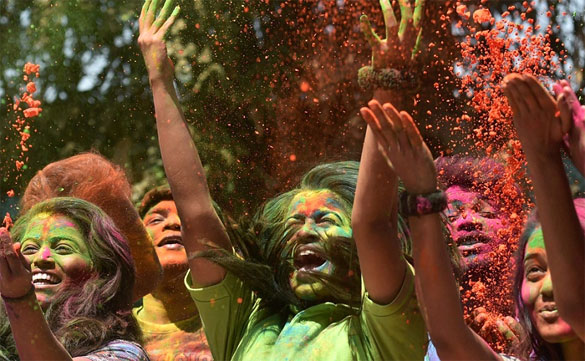
Festivals in India weren’t events of a religious nature, but rather cultural celebrations. The divisive discourse concerning religious festivals was introduced by the colonial rulers, which has now become institutionalised with time. Today, in India, if a Muslim celebrates Holi or Diwali, he may be excommunicated by members of his community. The same holds true for a Hindu who chooses to celebrate Muslim festivals. In fact, the issue of festivals and celebrating them has also led to communal riots in the country.
We were not always like this. On the occasion of Holi, I will argue that until a few decades ago, Muslims considered it an Indian festival rather than a Hindu one, using poems by Nazeer Banarasi.
On Holi here is a look at how Urdu poet Nazeer Banarasi wove the festival of colours into his verses
Nazeer Banarasi, who practised Unani medicine, was born in Varanasi in 1925. This eminent Urdu poet has written extensively about the nation, its festivals, and politics. In his poems one can sense the flavour of Varanasi’s culture. Not only he has written at least four poems describing how the festival of colours was celebrated, but he has also employed it as a metaphor and simile in his other works.
During the Chinese aggression in 1962, he addressed the nation to celebrate Holi of a different sort. He writes:
Nayi Tarah Holi Manao To Aayen
Vatan Ke Liye Khuun Bahao To Aayen
(I will come, if you celebrate Holi in a new fashion
If you shed your blood for the nation, I will come)
Banarasi has compared Holi to laying down one’s life for the nation, thus envisioning a new way to celebrate the festival.
In another poem titled ‘Mana Len Pehle Holiyan Diwali Phir Manayenge’, he urges the youth of the country to take up arms against the Chinese aggressors and play Holi with the enemies’ blood. He asks:
Lahu Se Phaag Khel Kar Gharon Ko Jagmagayenge
Shikast De Ke Dushmanon Ko Qumqumen Jalayenge
Mana Len Pehle Holiyan Diwali Phir Manayenge
(Houses will be illuminated after we play colours with blood
We will light up the lamps after defeating the enemies
First let us celebrate Holi and Diwali will be celebrated afterwards)
Holi and Diwali assume the shape of metaphors, which enable the poet to reach a larger audience.
Nazeer Banarasi has also written many devotional poems in praise of Lord Krishna. In one such poem, ‘Hume To Shyam Ne Holi Khila Ke Luut Liya’ (Krishna robbed us through Holi), he writes:
Hai Shaam Holi Ki, Lagta Hai Dil Pe Teer Pe Teer
Gulaal Khaak Udata Hai Aur Dhool Abeer
Chhadega Rang Pe Na Mere Koi Nazeer
Har Ek Rang Se Rangeen Bana Ke Luut Liya
Mujhe To Shyam Ne Holi Khila Ke Luut Liya
(It is Holi evening, arrows pierce the heart
Coloured powder has replaced the soil
Nobody can match my majestic complexion
He robbed me after colouring me better than any colour
Shyam robbed me after playing Holi with me)
As is evident, Radha is talking about Lord Krishna. Banarasi uses the setting of Holi to visualise divine love.
Apart from the use of Holi as a figure of speech, Banarasi has written a few poems solely describing festivities. In a poem titled ‘Holi’, he calls it a day to forget enmities:
Kahīñ Paḍe Na Mohabbat Kī Maar Holī Meñ
Adā Se Prem Karo Dil Se Pyaar Holī Meñ
Gale Meñ Daal Do Bāñhoñ Kā Haar Holī Meñ
Utāro Ek Baras Kā Ḳhumār Holī Meñ
(Look, there should not be dearth of love on Holi
Show affection through coquetry and love with your heart on Holi
Embrace with your arms on Holi
End the intoxication of the whole year on Holi)
Milo Gale Se Gale Baar Baar Holī Meñ
(Hug each other again and again on Holi)
Burāī Aaj Na Aise Rahe Na Vaise Rahe
Safāī Dil Meñ Rahe Aaj Chāhe Jaise Rahe
Ġhubār Dil Meñ Kisī Ke Rahe To Kaise Rahe
Abiir Uḍtī Hai Ban Kar Ġhubār Holī Meñ
(Wickedness will not remain in any form today
Piety remains in the heart in whatever form
How the impurity will stay in any heart
Impurities fly away with the colours on Holi)
In another poem ‘Ghazal Me Holi’ (Holi in a poem), he says:
Jab Dil Na Milne Paaye To Milne Se Fayda
Dil Ka Milan Zaruri Hai Holi Milan Ke Sath
(If hearts don’t meet, what is the point of meeting
The meeting of hearts is necessary after a Holi meet)
For him, Holi is an occasion to renew relationships and forget enmities.
In another poem titled ‘Holi Jawani Ki Boli Me’ (Holi in the words of youth), he describes it as an occasion of amusement.
ye boTī parī ban ke uḌne lagegī
zarā gholiye phir se gholī na hogī
(This cannabis will fly away like a fairy
Stir it again, it might not have dissolved)
As a resident of Varanasi, Nazeer Banarasi considers Thandai, which is made from Bhaang, an integral part of the celebration.
Banarasi is just one of the many Muslim Urdu poets from the 20th century who revered Hindu deities and Indian festivals. These writings are a reflection of the composite culture of India. As divisive politics tries to pit religions against each other, it is our duty to look back at our glorious past of mutual respect and brotherhood. To sum up, here is a poem which presents the spirit of India as Banarasi imagined it:
Mandir Me Gajar Baj Jata Tha Masjid Me Azaan Ho Jaati Thi
Jab Chandni Raato Me Hum Tum Ganga Ke Kinare Hote The
(Bells of the temple rang and the Azan was called from the mosque
When on a full moon night we used to be on the banks of Ganges)
—–
Saquib Salim is an independent socio-political commentator and historian
Courtesy: New Age Islam